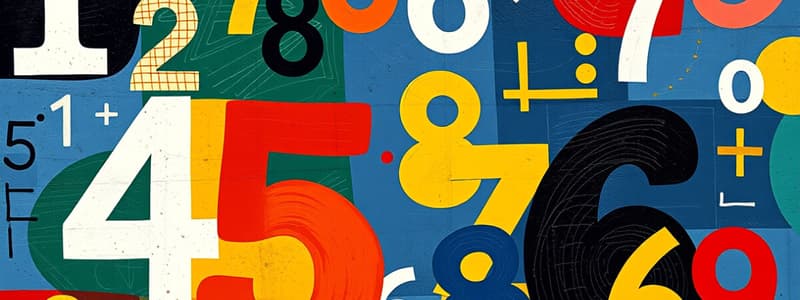Podcast
Questions and Answers
What are natural numbers and how do they differ from whole numbers?
What are natural numbers and how do they differ from whole numbers?
Natural numbers are positive integers starting from 1, while whole numbers include natural numbers along with zero.
How are integers defined in relation to whole numbers?
How are integers defined in relation to whole numbers?
Integers include all whole numbers and their negative counterparts, such as -3, -2, -1, 0, 1, 2, 3.
What is the defining characteristic of rational numbers?
What is the defining characteristic of rational numbers?
Rational numbers can be expressed as the fraction of two integers, where the denominator is not zero.
Explain what irrational numbers are and provide an example.
Explain what irrational numbers are and provide an example.
Describe the relationship between real numbers and the number line.
Describe the relationship between real numbers and the number line.
What are complex numbers and how are they structured?
What are complex numbers and how are they structured?
State the closure property and its significance in number systems.
State the closure property and its significance in number systems.
What does the commutative property state for addition and multiplication?
What does the commutative property state for addition and multiplication?
Summarize the distributive property and provide a formula associated with it.
Summarize the distributive property and provide a formula associated with it.
Why is understanding number systems important in mathematics?
Why is understanding number systems important in mathematics?
Flashcards are hidden until you start studying
Study Notes
Number Systems
-
Definition: A number system is a way to represent numbers. It consists of a set of symbols and rules for combining them.
-
Types of Number Systems:
-
Natural Numbers (N):
- Positive integers: 1, 2, 3, ...
- Does not include zero or negative numbers.
-
Whole Numbers (W):
- Natural numbers including zero: 0, 1, 2, 3, ...
-
Integers (Z):
- Whole numbers and their negative counterparts: ..., -3, -2, -1, 0, 1, 2, 3, ...
-
Rational Numbers (Q):
- Numbers that can be expressed as a fraction of two integers (a/b), where b ≠ 0.
- Includes integers and terminating or repeating decimals.
-
Irrational Numbers:
- Numbers that cannot be expressed as a fraction of two integers.
- Decimal expansions are non-repeating and non-terminating (e.g., √2, π).
-
Real Numbers (R):
- All rational and irrational numbers.
- Used to represent values on the number line.
-
Complex Numbers (C):
- Formed by a real part and an imaginary part: a + bi, where a and b are real numbers and i is the imaginary unit (√-1).
-
-
Properties of Numbers:
- Closure Property: The result of an operation on two numbers from a set is also in the set.
- Commutative Property: a + b = b + a (addition) and a × b = b × a (multiplication).
- Associative Property: (a + b) + c = a + (b + c) and (a × b) × c = a × (b × c).
- Distributive Property: a(b + c) = ab + ac.
-
Number Line:
- A visual representation of numbers in a straight line.
- Helps to understand relationships between different types of numbers.
-
Application:
- Understanding number systems is fundamental in mathematics, aiding in problem-solving and algebraic concepts.
Number Systems Overview
- A number system represents numbers using a specific set of symbols and rules for combination.
Types of Number Systems
-
Natural Numbers (N):
- Comprise positive integers starting from 1 (1, 2, 3,...)
- Excludes zero and negative numbers.
-
Whole Numbers (W):
- Include all natural numbers along with zero (0, 1, 2, 3,...).
-
Integers (Z):
- Consist of whole numbers and their negative counterparts (…, -3, -2, -1, 0, 1, 2, 3,…).
-
Rational Numbers (Q):
- Defined as numbers expressible as a fraction of two integers (a/b), with b ≠ 0.
- Encompasses integers, as well as terminating or repeating decimals.
-
Irrational Numbers:
- Cannot be expressed as a fraction of two integers.
- Characterized by non-repeating and non-terminating decimal expansions (e.g., √2, π).
-
Real Numbers (R):
- Form a comprehensive set that includes both rational and irrational numbers.
- Represent continuous values on the number line.
-
Complex Numbers (C):
- Comprise a real part and an imaginary part represented as a + bi, where a and b are real numbers and i is the imaginary unit (√-1).
Properties of Numbers
-
Closure Property:
- The result of an operation (like addition or multiplication) between two numbers in a set remains within that set.
-
Commutative Property:
- Addition and multiplication are commutative: a + b = b + a and a × b = b × a.
-
Associative Property:
- Grouping does not affect the result: (a + b) + c = a + (b + c), (a × b) × c = a × (b × c).
-
Distributive Property:
- Describes how multiplication distributes over addition: a(b + c) = ab + ac.
Number Line
- Provides a visual representation of numbers aligned in a straight line.
- Aids in understanding the relationships among different types of numbers.
Application in Mathematics
- Mastery of number systems is crucial for mathematical understanding and problem-solving.
- Fundamental in developing algebraic concepts and skills.
Studying That Suits You
Use AI to generate personalized quizzes and flashcards to suit your learning preferences.




